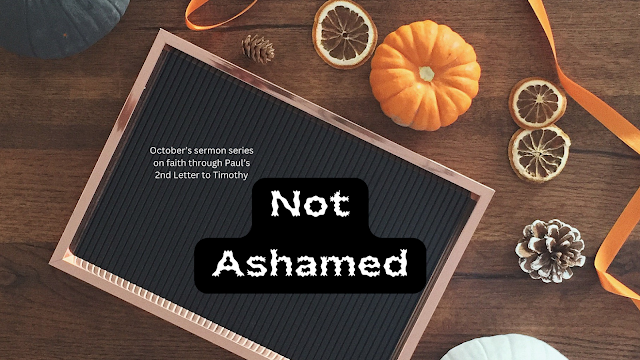The Gulf is Crossed - Luke 16:19-31 (Pentecost 16C)
Let’s start this text with maybe something a little lighter: There once was a rich man near death. He was very grieved because he had worked so hard for his money, and he wanted to be able to take it with him to heaven. So he began to pray that he might be able to take some of his wealth with him.
An angel hears his plea and appears to him. “Sorry, but you can’t take your wealth with you.” The man implores the angel to speak to God to see if He might bend the rules.
The man continues to pray that his wealth can follow him. The angel reappears and informs the man that God has decided to allow him to take one suitcase with him. Overjoyed, the man gathers his biggest bag, fills it with pure gold bars, and places it beside his bed.
Soon afterward, the man dies and appears at the Gates of Heaven to greet St. Peter. St. Peter seeing the suitcase, says, “Hold on, you can’t bring that in here!”
But, the man explains to St. Peter that he has permission and asks him to verify his story with the Lord. Sure enough, St. Peter checks and returns, saying, “You’re right. You are allowed one carry-on bag, but I’m supposed to check its contents before letting it through.”
St. Peter opens the suitcase to inspect the worldly items that the man found too precious to leave behind and exclaims, “You brought pavement?!!!” (You CAN take it with you? | Jokes of the day (55559). http://www.jokesoftheday.net/joke--You-CAN-take-it-with-you-/201703109)
Jokes aside, this is probably the best known of the four parables we’ve been studying this month. This parable is the third about “wasteful” stories - the prodigal son who wastes his inheritance before coming back home, last week’s “dishonest steward” who wastes his master’s possessions, and now the rich man who wastes his possessions. This also comes after the bit about the Pharisees who loved money but turned up their noses at Jesus when they heard him teaching about money.
So - to recount the story - we have a rich man (who is nameless - this seems a little odd but on brand for Jesus) and Lazarus ( a poor and sick person). Lazarus means “the one whom God helps” - quite ironic, wouldn’t you say? This broken man was laid - someone put him there because he was too sick to get there himself. We know he was hungry because he WANTED to eat (not that it says that he did) the scraps at the rich man’s table. Remember - isn’t this akin to the prodigal son who ate out of the pig trough? Sores covered his body which the street dogs would lick. This seems like it would be an insult, animals licking the wounds, but - looked at differently, it could be an act of mercy. At the time, in the near eastern culture, there was a myth that dogs licking wounds had healing properties; there was even a cult dedicated to developing dogs to do this. But I also noticed that the dogs were probably wild since they were not chained or caged; The wild dogs would have been seen as pests (just like Lazarus).
Given this difference, one constant remains in everyone’s life: we will die. Lazarus was too poor to have a funeral or to be buried, so the text says that angels carried him to be with Abraham, but the rich man is buried, but then he ends up in “She’ol,” which is the Hebrew word for most used for the place where the dead were believed to dwell. It’s used a few times in the Old Testament. In some translations, it is written as grave, others hell, and even “the pit.” this word doesn’t have a firm translation, so this dispute has existed for centuries. Regardless of semantics, the text used the term Hades (for the Greek underworld, to connect with its listeners when it was written).
But, from this viewpoint, he can still see Abraham and Lazarus, and the rich man knows who Lazarus is - he calls him by name! Now, you’d think he would have been put off, like - how’d that fool get a prime seat with you, or *scoff* what’s he doing THERE??? But he cannot claim ignorance about his life on earth. And yet, in the next breath, he is still trying to order Lazarus around- trying to get him to work his angles. John Donahue writes, “Perhaps he sees Lazarus for the first time. The difficulty with their relationship all those years on earth is that the rich man never SEES Lazarus. One of the prime dangers of his wealth is that it creates blindness.” The rich man was passively given good things. He didn’t do anything to earn or deserve them. Lazarus was passively given bad things; some terrible things he received were because the rich man didn’t share his good.
Like the older son in the Prodigal son, the rich man doesn’t listen to the father and doesn’t take time to remember what he was given. But yet, he realizes what he did because he asks Abraham to send him back to be able to warn his family about what happened to him so that THEY can repent! BUT YET, THE RICH MAN DOES NOT REPENT.
The rich man wants to be raised from the dead, so he can be a miracle to PROVE that this future will happen if they don’t. But Abraham says no. Abraham says their faith relies on who they have now - Moses and the prophets.
This line from Abraham compares to Jesus’ resurrection (which the hearers of the story don’t know is coming). Even in our modern age, we can tell everyone we know of the miracle of the resurrection, but sometimes the roadblocks of wealth get in the way. Some people think that all we need to do is prove our faith, which is enough to get others to believe, but it’s not that simple. So many other interests and investments of time, money, and dreams also get in the way of that.
Here is Martin Luther King’s interpretation of the story:
“This rich man is the white man who refuses to cross the gulf of segregation and lift his Negro brother to the position of first-class citizenship because he thinks segregation is a part of the fixed structure of the universe. The rich man is the Indian Brahman who refuses to bridge the gulf between himself and his brother because he feels that the gulf set forth by the caste system is a final principle of the universe. The rich man is the American capitalist who never seeks to bridge the economic gulf between himself and the laborer because he feels that it is natural for some to live in excessive luxury while others live in abject poverty. The rich man’s sin was not that he was cruel to Lazarus but that he refused to bridge the gap of misfortune between them. The rich man’s sin was not his wealth; his wealth was his opportunity. His sin was his refusal to use wealth to bridge the gulf between the extremes of excessive, inordinate wealth and abject, deadening poverty.”
I don’t think I can improve on MLK’s commentary. His words are as accurate today as they were in 1955 when he delivered them in a sermon. Jesus’ parable was old when he uttered it. A similar story circulated in ancient Egypt. The prophetic tradition has constantly urged the rich to attend and respond to the plight of the poor. Christians might be taken aback by the vivid imagery of hell (its Greek version, called Hades) in this passage. But note that the modern evangelical formula for hell-avoidance is missing! In this parable, you don’t have to “accept Jesus as your personal Lord and savior.” All that’s necessary to get to the bosom of Abraham is to follow the law of Moses and the guidance of the prophets. And there’s no mention of “heaven.” Genesis 25 says, “Abraham breathed his last and died in a good old age, an old man and full of years, and was gathered to his people.” The people of early Israel did not believe in an afterlife: being “gathered to his people” meant being buried with them. Lazarus’ reward for following the law and the prophets was to die in peace and be gathered to Abraham and the rest of his people. The cultural context of this parable makes it clear that it is not to be taken literally as a description of life after death.
But Christians ought to take it seriously. Those of us with the resources to help those who lack them must pay attention and respond meaningfully to their needs – not just with traditional charity, but with a commitment to structural social and economic change.
Just as Lazarus lay at the rich man’s gate, people in need may be near your “gate.” How will you help one or more of them—in small or large ways?
In the same way that the rich man influenced his five brothers, you influence other people through your beliefs and use of resources. What kind of example are you setting for your friends, family, and coworkers?
If the rich man’s crime is that he didn’t do enough to alleviate Lazarus’s suffering, then maybe we have hope. Knowing the Law and the Prophets should compel us to act in the world. Simply knowing the Bible without acting upon its teaching gets us nowhere. The Rich Man probably expected to feast with Abraham because he feasted every day. Why would things be any different after death? Jesus is revealing, though, that the Kingdom of God is different than this world. (NL 334: Rich Man and Lazarus - Luke 16:19-32 — Pulpit Fiction. https://www.pulpitfiction.com/narrative-notes/3-34/)




Comments
Post a Comment